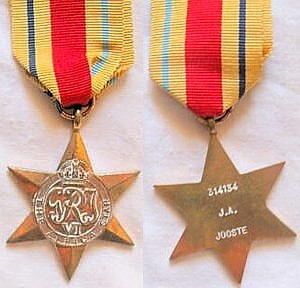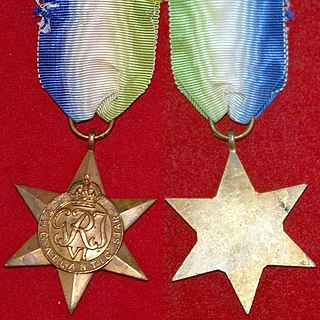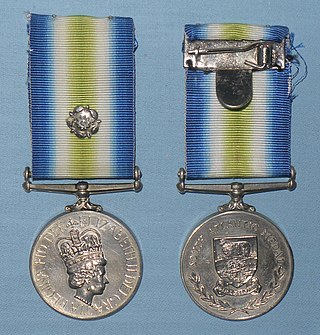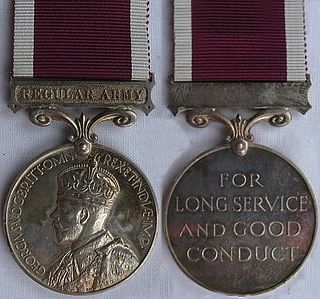
The Pacific Star is a military campaign medal instituted by the United Kingdom in May 1945 for award to British and Commonwealth forces who served in the Pacific Campaign from 1941 to 1945, during the Second World War.

The Africa Star is a military campaign medal, instituted by the United Kingdom on 8 July 1943 for award to British and Commonwealth forces who served in North Africa between 10 June 1940 and 12 May 1943 during the Second World War.

The Atlantic Star is a military campaign medal, instituted by the United Kingdom in May 1945 for award to British Commonwealth forces who took part in the Battle of the Atlantic, the longest continuous campaign of the Second World War.

The 1939–1945 Star is a military campaign medal instituted by the United Kingdom on 8 July 1943 for award to British and Commonwealth forces for service in the Second World War. Two clasps were instituted to be worn on the medal ribbon, Battle of Britain and Bomber Command.

The Air Crew Europe Star is a military campaign medal, instituted by the United Kingdom in May 1945 for award to British and Commonwealth air crews who participated in operational flights over Europe from bases in the United Kingdom during the Second World War.

The Burma Star is a military campaign medal, instituted by the United Kingdom in May 1945 for award to British and Commonwealth forces who served in the Burma Campaign from 1941 to 1945, during the Second World War.

The Gulf War Medal was a campaign medal approved in 1992, for issue to officers and men of British forces who served in Kuwait and Saudi Arabia during Operation Granby in 1990–91.

The Iraq Medal was authorised on 23 February 2004. It was a campaign medal issued to members of the British Armed Forces and certain attached personnel, who served between 20 January 2003 and 22 May 2011 on, or in support of, Operation Telic - the designation for British operations during the 2003 Invasion of Iraq and its aftermath.

The Operational Service Medal for Sierra Leone is a campaign medal established in 2000 by the Ministry of Defence of the United Kingdom for participation in the British military intervention during and after the Sierra Leone Civil War, from May 2000 to July 2002.

The Operational Service Medal for Afghanistan is a campaign medal previously awarded by the Ministry of Defence of the United Kingdom for service by British Armed Forces personnel in support of the post-2001 Afghan War.

The Operational Service Medal for the Democratic Republic of the Congo is a British armed forces campaign medal, awarded mostly to military personnel who served between 14 June and 10 September 2003 on Operation Coral.

The South Atlantic Medal is a British campaign medal awarded to British military personnel and civilians for service in the Falklands War of 1982 between the United Kingdom and Argentina. Over 33,000 medals have been awarded. The South Atlantic Medal Association was formed in 1997 for recipients of the South Atlantic Medal.

The General Service Medal, is a campaign medal of the United Kingdom introduced in 1962 to replace both the General Service Medal (1918), as awarded to the Army and RAF, and the Naval General Service Medal (1915). The 1962 GSM was awarded until 2007, when it was replaced by the Operational Service Medal. In 2015 the General Service Medal (2008) was introduced.

The Defence Force Service Medal (DFSM) is an Australian Military award given for long service by permanent members of the Australian Defence Force. It is part of the suite of defence force service awards introduced in 1982, which also included the Reserve Force Decoration and the Reserve Force Medal.

The Australian Active Service Medal 1945–1975 recognises the service of Australian Defence Force and certain other persons in prescribed warlike operations in the period after World War II, and prior to February 1975. The medal was established in December 1997. The Australian Active Service Medal recognises warlike service after February 1975 until 2012 when the Australian Operational Service Medal was instituted.

The Decoration for Officers of the Royal Naval Reserve, commonly known as the Reserve Decoration (RD) was a medal awarded to officers with at least fifteen years service in the Royal Naval Reserve (RNR) of the United Kingdom. The medal was instituted in 1908.

The Medal for Long Service and Good Conduct (Military) is a medal awarded to regular members of the armed forces. It was instituted by King George V in 1930 and replaced the Army Long Service and Good Conduct Medal as well as the Permanent Forces of the Empire Beyond the Seas Medal. The medal was originally awarded to Regular Army warrant officers, non-commissioned officers and men of the UK Armed Forces. It also had a number of territorial versions for the Permanent Forces of the British Dominions. The eligibility criteria were relaxed in 1947 to also allow the award of the medal to officers who had served a minimum period in the ranks before being commissioned. Since 2016, the eligibility was widened to include officers who had never served in the ranks, and so the medal can now be awarded to all regular members of the British Armed Forces who meet the required length of service.

The Arctic Star is a military campaign medal instituted by the United Kingdom on 19 December 2012 for award to British Commonwealth forces who served on the Arctic Convoys north of the Arctic Circle, during the Second World War.

The General Service Medal 2008 was introduced in 2015 for award to Royal Navy, Royal Marines, Army, and RAF personnel to recognise specified operations since January 2008, not qualifying for another campaign medal. Unlike its predecessor, the General Service Medal (1962), operations will be denoted by clasps indicating the geographic area of operations, rather than a specific operation. The first awards of the medal were made by Secretary of State for Defence Michael Fallon at a ceremony on 12 June 2016.

The Operational Service Medal Iraq and Syria or Operation Shader Medal is a British armed forces campaign medal, awarded mostly to military personnel who served in the operational area of, or in support of Operation Shader. The medal was first announced by then Defence Secretary, Sir Michael Fallon on 19 September 2017. It was first awarded, to service personnel, on 18 July 2018 in London by Defence Secretary Gavin Williamson. This Operational Service Medal is the first medal of the contemporary era to be awarded to individuals who served outside of the operational area, reflecting the changing nature of warfare.



















